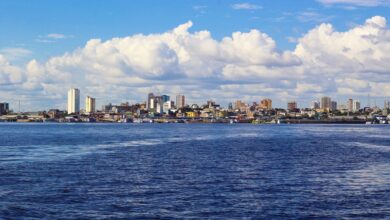Opinion: The War On Drugs Won’t Save the Environment
While drug trafficking is one of the illegal industries that harms the environment the most, the failed war on drugs is not going to save the environment .

Climate change is breathing down our necks today more than ever. At the same time, world leaders meet in prestigious assemblies, exchange greetings, words, ideas. Photo: Unsplash
LatinAmerican Post | Vanesa López Romero
Listen to this article
Leer en español: Opinión: La guerra contra las drogas no va a salvar el medio ambiente
Climate change is breathing down our necks today more than ever. At the same time, world leaders meet in prestigious assemblies, exchange greetings, words, ideas. They pretend to save the planet, to mitigate the environmental crisis, to take care of species, to protect protected areas, to take care of environmental leaders, but it's all words. Treaties are signed but not complied with, sometimes not even ratified, as is the case with the Escazú Agreement in Colombia. Other times, the slightest effort results in awards or undeserved prizes.
In the midst of climate change, on the road to an unpromising future, our leaders put on a media show to pretend that they are doing something to avoid what is inevitable. And while all this is happening, the policies are less and less useful, they give less results and sooner they end up in one way or another contributing to the initial problem. Something like that happens with the failed war on drugs. One that has created irreparable violence, laws that affect the weakest links in the drug trafficking chains, vulnerable communities and those who profit the least from it.
Also read: Infographic: Discover how many resources are spent on your food plate
You may be wondering, what do drugs have to do with the environment? Well, drug trafficking is one of the illegal industries that contributes the most to climate change. From deforestation to enable land for illicit crops to chemicals discarded by the production of synthetic drugs that end up in wastewater and eventually in all kinds of ecosystems.
It is no coincidence that Mexico, where marijuana is grown par excellence, and Colombia, where coca is the protagonist, are two of the countries in the region with the highest rates of deforestation. Be careful, here I am not saying that the drug industry is the one that generates the most deforestation. That position is held by the livestock industry, which of course is legal and untouchable.
Drug trafficking is the headache of Latin America, and a failed war on drugs that has led to absolutely nothing is proof of this. In Colombia, for example, the environment is on the agenda when you have to give reasons why drugs are the problem. But it disappears when, overnight, thousands of hectares of coca crops have to be eradicated with glyphosate, a pesticide that has proven to be harmful to the health of the environment and human beings.
Perhaps drugs as such are not the problem. Even if the laws exist this will continue to happen, as it has been happening from the beginning, right under their noses. The environment, communities, and vulnerable people will be the ones who will experience its consequences the most. Nothing will be achieved as long as regulations that make sense and that do not demonize certain substances are not made,
At a time when our gaze must be focused on the environmental crisis, thinking about these types of cross-cutting problems with each other will make a difference. Why keep doing something we know is not working? It is time to rethink how we connect one with the other.
Ultimately, without environmental health, there is no human health.




